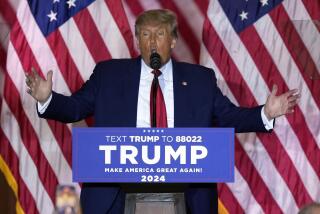Rumors of Nixon Drug Use, Wife-Beating Called Ludicrous
- Share via
WASHINGTON — Was Richard Nixon hooked on mood-altering drugs? Was he a wife-beater?
Preposterous, say the people closest to him. But a new book by a British author has delighted Nixon’s critics by painting a caricature that many would like to believe.
Anthony Summers, in “Arrogance of Power: The Secret World of Richard Nixon,” offers little hard evidence for his provocative allegations. In fact, he’s frank to say they are based on secondhand, and in some cases third-hand, hearsay.
Steve Bull, a close personal aide to Nixon from his first White House days in early 1969, told The Times that some people are willing to believe the worst about the only president to resign from office, even without hard evidence.
“The guy has been so demonized that anything goes,” Bull remarked.
He added, “There was never an indication of [drug dependency]. It’s a ludicrous charge. As to striking his wife, I never saw any indications, any sense that such behavior ever occurred, and I remained with the Nixons for three months after they retired to San Clemente.”
As to drug use, the book reports that Jack Dreyfus, eccentric founder of the Dreyfus Investment Fund and a longtime Nixon pal and financial supporter, gave Nixon 1,000 capsules of Dilantin in 1968 as part of his personal promotion of the drug. Dreyfus has confirmed this, saying he did so when Nixon’s “mood wasn’t so good.” He said he later provided Nixon with another 1,000 capsules.
Introduced in the 1930s, Dilantin is a mood-altering, anti-convulsive drug most often used to control epileptic seizures. The book cites no direct evidence that Nixon ever used the pills.
John H. Taylor, a former Nixon aide who runs the Richard Nixon Library & Birthplace in Yorba Linda, speculates that Nixon might have accepted the drug from Dreyfus to avoid offending him, “and then threw the pills away.”
Summers also writes that he was told by people with secondhand information that Nixon struck his wife, Pat, in anger “and blackened her eye” after his 1962 loss in the California gubernatorial race. Summers says another assault occurred after Nixon’s resignation from the presidency in 1974.
A former Nixon aide, John P. Sears, has confirmed that he told Summers he heard of this alleged abuse from Waller Taylor and Pat Hillings, two friends of Nixon who now are deceased. Sears is a retired Washington lawyer.
“Mr. Sears cannot be condemned for repeating hearsay and gossip,” John Taylor said of this charge. “Mr. Summers should be condemned for putting it in his book without any corroboration or basis in fact.”
Patricia Nixon Cox, younger daughter of the Nixons, recently issued a public statement disputing both the drug charge and the wife-beating accusation, saying that she knew both were untrue.
Cox said she doubted her father took medication for mood swings because “he believed unless something was very serious, you just avoided medication.” She said Nixon even declined Novocain at the dentist’s office.
John W. Dean III, Nixon’s former White House counsel who helped prosecutors unravel the Watergate cover-up, said in a telephone interview that the drug and wife-beating charges could be true, but acknowledged that he has no direct personal knowledge of them.
Dean related that in discussions with Nixon, whom he described as notoriously moody, he often saw the president struggle to open a bottle of medication. Noting that lack of coordination is a side-effect of Dilantin, Dean said Nixon “could not press down and turn to open the bottle.” Dean added that Nixon’s sometimes awkward gestures “seemed the opposite of what he was saying” in conversation.
Dean, a private investment banker in Southern California, said that although he never heard any allegations of wife-beating, “it was clear to the White House staff that the Nixons had a very chilly marriage.”
He recalled that in coordinating estate planning by the president and his wife, “I got a flat order that the president did not want Mrs. Nixon to be involved in the estate plan until the time came for her to sign the papers. I thought that was very strange.”
More to Read
Sign up for our Book Club newsletter
Get the latest news, events and more from the Los Angeles Times Book Club, and help us get L.A. reading and talking.
You may occasionally receive promotional content from the Los Angeles Times.






